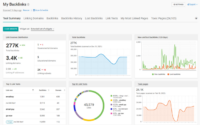What’s the Difference Between High Quality and Low-Quality Links
Links are one of the powerful ways to get better SEO scores and higher organic ranking. But every link doesn’t create in the same way. In this article, we are going to discuss the difference between high-quality and low-quality links. At the end of the article, you will be able to get a clear idea about what makes high-quality links and where you can find opportunities to build them.
How Do Search Engines Use Links
Search engines use links to discover website existence and determine information about a website. Google’s help documentation mentioned it as below.
“A link from page A to page B is seen by Google as a support for page B. Votes from “important” pages carry greater weight and make other pages “important” by themselves.”
Bing’s Webmaster Help and How-To guide mentioned about it also.
“Bing likes to see links that are developed organically. This effectively indicates that people link to your content because they value it, which is how links are built. Because it is viewed as a vote of confidence in the content, this is a significant signal to a search engine.”
What is the Value of a Link?
Google uses links as votes. A link from a well-regarded website has more clout than a link from a lesser-regarded website.
Authority
Many SEO tools try to give an authority metric to a website to make it quality. What does mean an authoritative website? It is a website that search engines think of as a reputable source of information about a subject. Google uses a site’s backlinks to determine site’s trustworthiness and expertise in the subject.
If your webpage is linked by an authoritative webpage, it can be a strong signal which says it is an authoritative source. For example, let’s take two websites about interior design. An expert of interior design websites links to your lesser-known website. This means the expert site is confident enough of your site’s content. Therefore it sends its visitors to your site. It is a great way for search engines to identify the reputation of a site and its authority.
Relevance
Do you believe that authority is the only thing search engines consider? No, it’s not. Let’s take an easy example. Imagine you are going on a holiday and visiting a city that you never have been to. You want to know about the best restaurant in this area. You can ask either your friend who lives in that city for years or a travel guide who lives far away from that city. Your choice would be your friend. You might think to ask from travel guide because you think he is more knowledgeable. But it’s not his area at all.
Search engines use the same way to understand your website’s value. Imagine there are two sites. The first one is about reviews of restaurants and the other is about a local community group that had an outing to a restaurant. Your search about “sushi restaurant in New York”. Both sites have pages about “best sushi restaurant in New York”. Then what would be in the higher of the SERPs? It would be reviewing site. Because it is the most relevant site. Therefore Google will show it.
Authority and Relevance
If a site is both authoritative and relevant, it is the best source of a link.
What does Make a Link Low Quality?
Before knowing the difference between high-quality and low-quality links, it’s better to know what does make a link low quality. Links from both authoritative and relevant sites are considered high-quality links and links both not authoritative and irrelevant are considered low-quality links. I’d there a site that allows anyone to submit a link, unlikely to have quality content and being an authoritative site. If anyone can add a link to their site means it cannot be a particularly relevant industry. Links of this kind a not authoritative and irrelevant and are useless and they are low-quality links. They can give you a little positive impact on organic rankings, overall it’s useful.
Paid Links
Paying for links to get rankings is against any search engine guidelines. But if you get links in this way, they cannot be identified. Therefore you won’t get a penalty. But if Google identifies a website has gotten a link from a website that sell links, the webpage it links to will be penalized.
However, You can place your links on websites for a fee, if you are using affiliate marketing and banner advertising method on the internet. Those links are considered sponsored links and webmasters can place them with the rel=” sponsored” attribute. This tag says search engines, that link has been paid and is not to consider for organic search rankings. This means they only consider search engine marketing and they don’t affect page rankings.
NoFollow Links
Before rel=” sponsored” tag was introduced by Google, search engines used the rel=”no follow” attribute. Using rel=” no follow” attribute with a link means it is a signal to search bots not to go to the destination of that link says. Publishers use this tag to stop search engines from visiting the page. If a site links to yours with this attribute, it won’t affect your rankings at all. Google use this tag as kind a of hint and then they ignore it. Nofollow links are useless in SEO practices also.
Links
Low-quality links are either,
- Irrelevant in helping Google to determine a site’s authority on a subject
- Or harmful
Now let’s take a look at low-quality, high-quality links, and medium-quality links. High-quality links are the most beneficial to your site. But it’s hard to earn them. Medium-quality links are also good. It is a part of a healthy backlink profile. But not beneficial as high-quality ones.
Low quality – Low authority and low relevance
There is a high chance to get these types of links. Because they do not require real effort. You can get them by simply sourcing links, asking for them, or adding them yourself.
Open directories: These kind of sites are really low quality. Usually, they offer only one service. It is advertising your site. You don’t have to pay for it. There are links to almost every kind of business on those websites. There are reputable local business directories also. They will help you to verify your business details like their physical address. But they won’t your site’s organic rankings. You can identify the difference between generic open directories and reputable local directories just as you visit them.
Comment links: Anyone can add content to blog comments and forums. Therefore Google doesn’t count any user-generated content. They started devaluing them because they were easy targets for squeezing links to sites. When Google released rel=’’sponsored’’ attribute, they also released rel=’’ugc’’ attribute. Webmasters can use this attribute to say the links which are in their forums are user-generated links.
Low quality – Low effort and no value
Social media posts: Many large social media sites use ‘’no-follow’’ tag. Google has said they are taking nofollow tags as a hint. But using backlinks in social media sites, won’t consider for organic rankings. Any business can make their pages in social media, talk about their sites through posts and add links back to their websites. But search engines ignore those because of they are biased.
Medium quality – Low authority but high relevancy
Small industry blogs: Small industry blogs can be sites that are run by companies or individuals who want to build their profiles and share their knowledge. Featuring your site by these kind of small industry blogs is a good reinforcement of your relevance with the industry. Those blogs might not be well known for getting own authority. But they can be highly relevant to the industry. These small industry blogs writers are less over run with requests to add links and share content than well-known ones.
Small industry brands: There might be some brands in your industry that are not competitors but related to each other. For example, you are doing an office supply store and your paper manufacturing company links your site as their distributor. It will help to show your authority in your industry.
Medium quality – Medium authority and medium-low relevance
Local news site: Your local news site can report anything you’re doing with your community. You can do something newsworthy and get featured easily. If you can get a link from a website that is known as a source of reliable local information, it will help search engines to see your relevance. If you want to boost SEO, getting links from them is valuable.
High quality – High authority but medium or low relevance
There are some sites that are highly authoritative. Its really hard to get a link from them. But if you would be able get, it will improve your SEO. These links might not be relevant. But you can get benefits for you visibility in SERPs.
National News sites: There are some national and international news sites which has high authority. Getting links from them will give you many benefits. But its really hard to do. Because journalists have many article ideas and press releases. If you wanna get their attention, you need to do something newsworthy.
High quality – Medium authority but high relevance
Big industry blogs: These are websites that everyone in the industry goes to for their news. According to authority metrics, they can be medium quality, but they are leaders in your industry. These websites are relevant to yours. If you can get a link from them, it will be a sign of your expertise in the Industry.
High quality – High authority and high relevance
Big industry brands: Big industry brands are household names. These brands are the leaders in your Industry. Therefore if you can get links as a distributor or supplier, it is beneficial. If you can be just mentioned by them, enough to get ranking benefits.
We believe that you would be able to get a clear idea about the difference between high-quality and low-quality links. Don’t waste your time looking for getting links from low-quality and unrelated sites. Instead, make newsworthy and quality content, then you can get attention from relevant and authoritative sites.
Suggested Articles
https://www.searchenginejournal.com/high-quality-links-vs-low-quality-links/393125/#close


